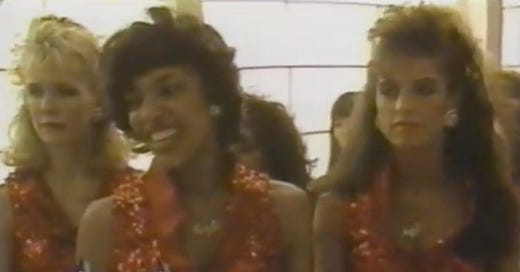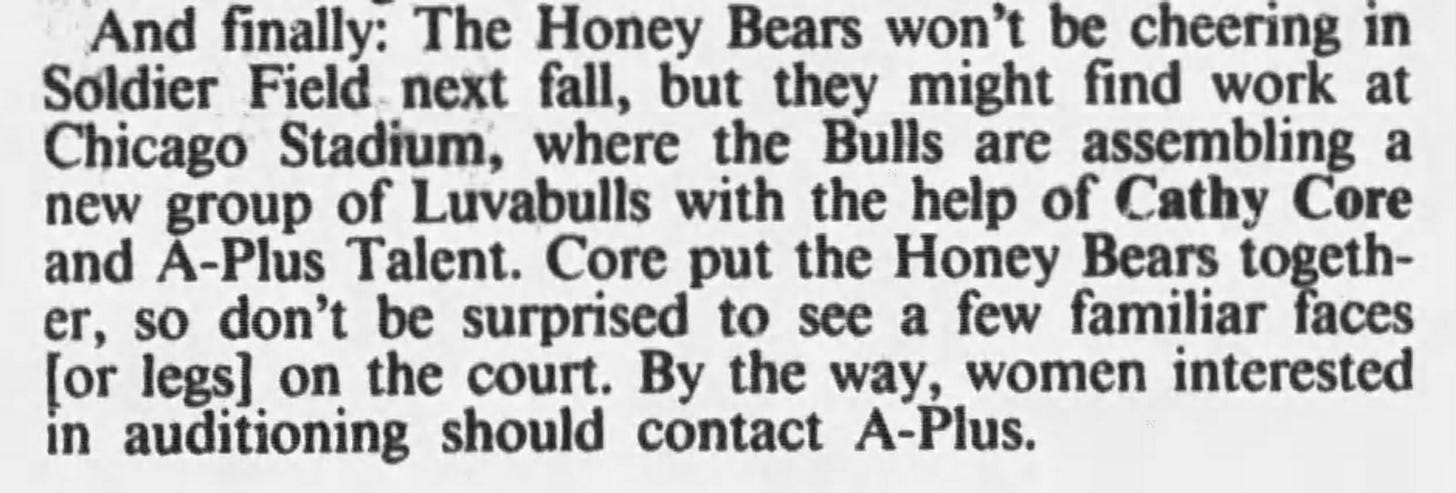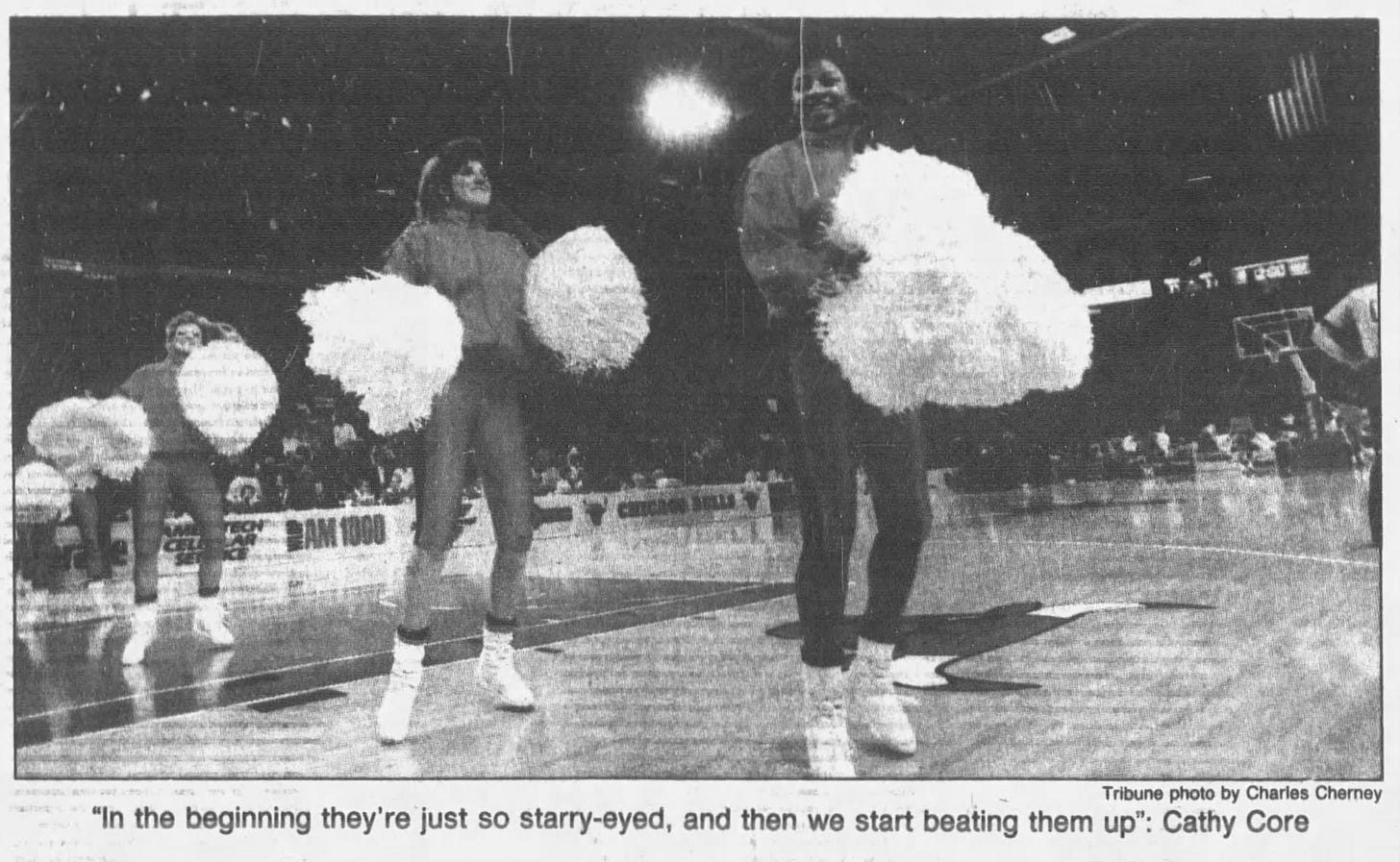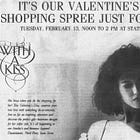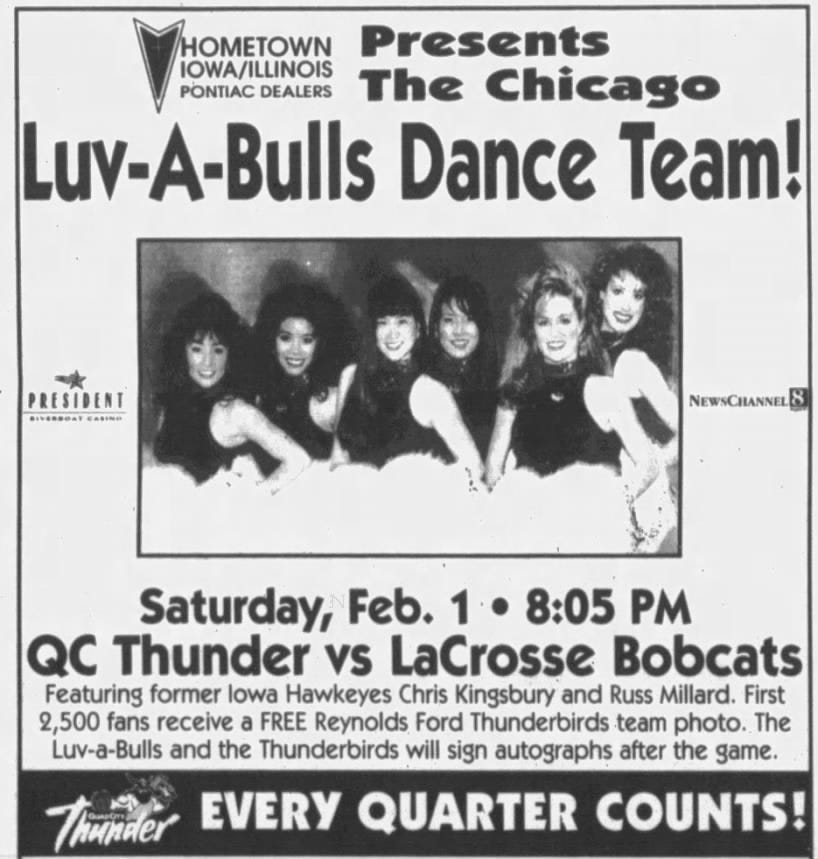"Bulls fans: the Luvabulls!" — An interview with longtime director Cathy Core
The Luvabulls legend has done, and seen, it all.

From the moment Bulls fans walked into the arena to the moment they left, one rule stood above the rest.
Keep ‘em entertained.
In the dynasty days, the Bulls were the greatest show in sports. But going to Bulls games had to be about more than just the Bulls, and a big part of that entertainment were the Luvabulls. They usually had one major performance per game. But they danced during timeouts. The more timeouts, the more dances. The fourth quarter of a close game had a lot of timeouts. The fourth quarter of a close NBA Finals game? That was unlike anyone had ever seen.
“It seemed like every 30 seconds there was a timeout,” Luvabulls director Cathy Core recalls about Game 6 of the 1992 NBA Finals. “We didn’t have headphones. You couldn’t hear yourself. Everybody’s faces were beet-red from yelling and singing and the excitement. The girls were drenched in sweat because they were dancing so often in that fourth quarter. But what a memory, right?”
That championship celebration was one of many moments that defined Core’s time leading the Luvabulls. The New Jersey-native came to Illinois with her husband in 1974, launched the Bears’ Honey Bears in 1977 at the request of Jim Finks via George Halas, and took over the Luvabulls in the fall of ‘84, making her a Bulls rookie alongside another Bulls rookie, Michael Jordan1.
In this interview, conducted last summer in partnership with filmmaker Matt Flesch, Cathy Core reflects on a career spent with the greatest show in sports: from Game 6 to the McDonald’s Open in Paris, from jokes with MJ to talking climate control with Phil Jackson, and an inside look at how the Luvabulls auditioned, trained and performed2.
This interview is edited for length and clarity.
Let’s talk about the Luvabulls. What was the process of pulling together the squad? Everything from the tryouts to the rehearsals, how you ran it, the grind that it was.
“Grind” is a perfect name for what was going on. First of all, it was indoors, which to me was the greatest thing. After spending nine years out in the freezing cold Soldier Field, although it was 41 games, it was indoors. So I loved it. Bulls fans were needing something because back then, they weren’t doing too well. They needed a little spike up to all their entertainment.
The audition process was intense the first year. We didn’t get that many auditioning because the NBA and the Bulls were not everybody’s cup of tea. I think the first year we got 300 or 500 girls to come out, and that was okay. We picked the squad and from that day until opening night or even preseason, it was night after night of practicing and getting music edited and getting music approved and getting costumes approved and all the things that are needed to make the whole package right.
We weren’t just looking for somebody who could dance. They had a lot of speaking engagements. We had to make sure that the girls were knowledgeable of what they were talking about, how they appeared on camera, how they sounded on mics — their look of course, but all those things entered into the process of picking the girls we thought would best represent the Chicago Bulls. We got a lot of flack because so-and-so is a better dancer than so-and-so, and you didn’t pick her. Nobody understood the intricacies of what we were looking for.
These girls traveled all over the world. We’ve probably been around the world a couple of times with all their international travels, because of Michael Jordan and those championship years. So we were very fortunate. It was wonderful.
How often did the team practice, and how did you get ready in a place that was such a dungeon?
The girls had to have a full-time job, because they could not make a living out of what they were being paid for this part-time dancing job. So their work ethic had to be right up top. They came from a 9-to-5 job two or three nights a week for practice, and then sometimes two nights a week for a game or one game on the weekend. It was nonstop 24-7. They were exhausted. We would practice, and I forget in the early years where we practiced. We had to beg for space. Nobody was going to give up the space just because the girls dance for the Bulls. So we had to find a space and rent it.
They had to be at practice by 7:00. Some nights it was 10:30 or 11 and we were still there. And then they had to get up and go to work and come back and do the whole thing all over again.
So it was torture in the beginning. And then on game day they would have to be at the Stadium — I think the games were at 7:30 — but if the game was at 7:30, they would have to be at the Stadium no later than 6:00. And then they had X number of minutes on court to practice and block — what we call blocking. Because when you're in the studio, you can't get the feel of actually being on a basketball court. So we would have to go out and they would have to block their dance.
Meanwhile, both teams were on either end of the court doing a shootaround and practicing. So we had to dodge basketballs and men — you know, they're running up and down the court. All the girls were out in the middle of the court trying to block whatever dance they were doing and get it all coordinated and timed. It was kind of crazy, but fun. You don't want to trip Michael Jordan as he's out there shooting. You don't want to trip him, Scottie Pippen or anybody. They would laugh and sometimes they hear the music and start to dance a little bit, just to break it up and have some fun.
One time, one of the players came over to me and said, Cathy, who's playing the music? I said, we have somebody upstairs at play. And he goes, “You've got to change the music. They're playing the same song over and over.” “What are you talking about? That's the song that we're dancing to tonight.” We just got the biggest laugh out of that.
You show up at the game: where do the girls go?
We entered gate 3 ½ , the infamous gate 3 ½ in the parking lot where all the players and the staff and the wives and the girls entered, and then we went down into the dungeon. We had, I wouldn't call it a locker room, but we had a room that was right next door to the Bulls locker room. We didn't have lockers. We had hooks on the wall, and that's where the girls would hang their clothes. One toilet with a door that you had to almost go in sideways, and one sink and one mirror in that little bathroom with ten girls. Their uniforms are set up on a hook, (so) you have a quick change, you really have to be organized.
We'd have to kill the cockroaches that were walking up the wall at the same time that the girls were trying to get dressed and all this screeching. Prior to us going out on the court for practice, we went all the way around behind, I don't know what side, maybe the east side of the stadium, and we would practice there.
That was really the dungeon. That's where the little mice played and the resident cat was back there and the girls were back there. When the players were leaving to go out to shootaround before the game, every time they walked by our locker room, they’d of course bang on the door. Just being playful, they weren’t trying to get in or anything, but they let you know that they were going by.
The girls were all dressed at that point. When they went out for the game, the girls would line up in that hallway down there with the poms, and then the guys would walk through and then we’d all go upstairs.

We’ve read that there were rules about not fraternizing with the players. But what was it like trying to manage that?
We had hard and fast rules. From the Luvabulls standpoint, if there was fraternizing or any kind of a problem with the players, they'd be fired. Everybody knew that nobody was going to fire a player. But there was a fine line, right? We had to try to make sure that the girls knew that they were representing themselves as women and also representing the Bulls when they were out and about. Lots of times, they'd be out in a group going to dinner and some of the guys would be out going to dinner and they'd be in the same places or in a dance club or something like that. You have to be human, right? Nobody’s saying you can't talk to anybody. But you just have to watch yourselves.
These guys were superstars. And I would tell them, nobody’s going to fire so-and-so, but you will be let go if you go against any of these rules. It happened a couple of times, but it was really under control. It was quite difficult at times because they were all over the place and the girls were all over the place. The one thing about being on Rush Street back in the day and all of those clubs downtown, I had a lot of friends who worked in a lot of places. And they delighted to call me up and say, “Oh, the Luvabulls were in last night.”
If it wasn’t an appearance, they were out on their own time. I would say, “Oh, thank you.” And I hang up and then I go to practice that night and I would just nail them. I would give them the whole story of what I heard. They’d be just like, She’s everywhere! She’s got friends everywhere! (Laughs.)
What was the schedule for performances? Luvabulls would be on the floor, under the basket. What was the in-game schedule to be out there?
Like you said, they were under the basket back in those days so they were there for the entire game. And we were given a sheet beforehand, a writeup of the night. Back then there wasn't a lot of entertainment for the Bulls. We had Benny the Bull, the girls, every now and again they would bring in the halftime act. The girls very rarely did halftimes back then. So they knew at the second quarter, first time out, that was their slot to go out and dance. So they had to be ready for that. The music had to be ready. Everything had to be cued.
We didn't have a lot of opportunity for communication. I think we had walkie-talkies back then, but it wasn't for everybody. So you had to make sure that everybody knew what they were doing and when they were doing it and all of that. And then then they'd come back and they'd sit under the basket and then just react to the game. Most of the time they only had one performance per game, but during the fourth quarter when the game was down to the wire, every other minute they were calling a timeout, right? So that was the girls’ opportunity to go out there and to dance in those timeouts and keep the crowd on their feet and keep the stadium energized.
At halftime we would go back in and regroup. Rest a little bit. And listen to Phil Jackson yelling or doing what he was doing, because we were right next door. If they were having a bad game or whatever, we’d be sitting in the locker room and (makes listening face).
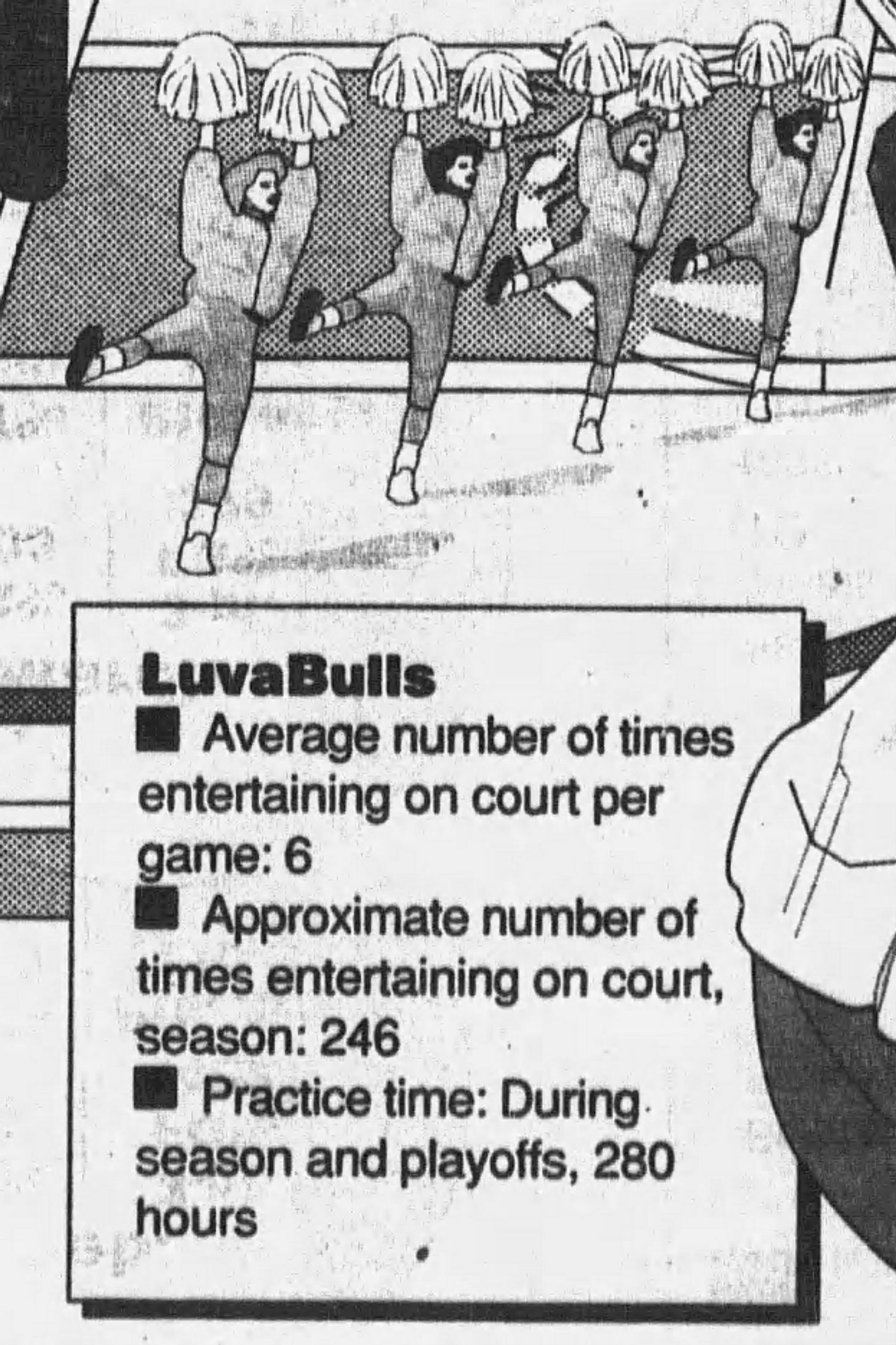
Oh that’s interesting. So the walls were that thin?
When voices were raised, you could hear it. And you can hear the guys giving it to each other, or whatever they were saying. And the other thing about the Stadium was that the thermostat was in our locker room. I don’t know why. And of course, the girls were always called. It was freezing in there because of the ice. It was always freezing in the Stadium. It was freezing in the United Center, too, but the Stadium especially. So we turned the heat up.
One night, Phil Jackson came and knocked on the door and said, “Cathy, what are you doing? We’re dying next door. Turn the heat down.” This was before I even knew that the thermostat was (for their room too). He goes, “We’re dying next door. Turn the heat off!” And I was like, “Oh, okay.” (Laughs.)

1992, Game 6. It was the only time they won the title at home at the Stadium. What are your memories of that?
My heart never stopped pounding. It was so electric in that arena. It was unbelievable. And the girls were exhausted because, like I said, in the fourth quarter, especially in that game, how many timeouts were called, you know? It seemed like every 30 seconds there was a timeout. So the girls would have to go out there. And Gary Glitter and his song that was so popular — it was the standard.
I really can't explain that part of it because it was so exciting. You never stop screaming. You never stop moving. It was electric. I just loved it.
At times it was so loud in there and the stomping was so — I was afraid the Stadium would fall down. I was like, This can't possibly be holding up all these people with all this stomping and dancing. It was the most exciting thing.
Tell me more about where you are. Where are you situated? How are you coaching them? Where are you in this carnival?
“Carnival” is a good word. My choreographer and I had floor seats pretty close to one of the baskets. So we had a visual on everything that was going on. I had a walkie-talkie so I could hear what was going on from the scorer’s table and the big board. We had to know basketball. Offense, defense, who was doing what. So I was right there, living it. Having the guys running back and forth and having to sweat on you when they were running by — like I said, it was electric.
And then when they won it, did you guys go down and celebrate and pop champagne and stuff?
Oh yeah. As a matter of fact, I believe it was that championship they locked us in the Stadium.
They would not let us go home or go out because it was so crazy down on Madison and around the stadium. Not that we were going to go anywhere because we were celebrating, but even when it was winding down and it was time for us to go, they locked us in. And then when it was time to go, we had an escort out of the Stadium and into our cars in the parking lot.
But oh yeah, the champagne was flowing. Buckets of water were being thrown on people. If you opened a door, you'd get slapped with either champagne or a bucket of water or beer or whatever they were celebrating with. The guys had their cigars in the locker room. Everybody had their championship t-shirts on. That was really the best. The best. And that was the only time that we got to celebrate with the guys in that kind of an atmosphere. They were just so happy. One of the greatest memories.
So you’re downstairs in the locker room, celebrating, but you’re staying there pretty late because you have to wait. Did you guys go back on the floor when the fans were gone?
First of all, right after the game, everybody was on the floor and everybody was celebrating because the fans were still there. The confetti was happening. After that, we were in the locker room and never went back upstairs because there was no reason to. It was dark. Everybody was gone.
And then when we left, we went downtown then and celebrated and whatever clubs were happening. Because they had parties set up in different places. The streets were just crazy. Even downtown Rush Street, Division Street, you know, thousands of people were still partying down there. So the girls just carried on with them.
I wanted to ask a few other questions about other performers who were there: the Jesse White Tumblers, the Bulls Brothers, the Incredibulls, all those things. Would they share that locker room with you?
They were in the dungeon with us. There was a locker room right next to the Luvabulls. So it was the Bulls, the Luvabulls, and then whatever entertainment was in for halftime. The Jesse White Tumblers were around the other side because they needed the room to practice. That was a big group. And Benny the Bull, that was his locker room. So all the other entertainment came out of that little locker room. It was crazy.
It was like one big happy family and everybody knew where everybody was supposed to be and what time they were supposed to be on. It was hectic down there. But, you get upstairs and everybody just thought, “This is so normal.” While we're downstairs running around like crazy people.
One time they had a dog act. I think her name was Lola. She was in the room next door. She was a sweet dog, but she barked. She was in the room. And the beginning of the game, the guys were walking out to start the game and they were walking past the locker room.
Like I said, sometimes they’d bang on the door. So this one time, Michael banged on the door next door to us where Lola was, and he didn't know a dog was in there. Lola started barking and came to the door, and Michael, he was like, (yelling) “Why is there a dog in there?” It’s an act! It’s one of the acts. It was a funny thing and made me laugh. He goes, “It’s not funny Cathy!”
But this dog was so sweet. And all of a sudden she’s barking her head off at Michael. The dog scared him so bad.
What did you think about the noise? I mean, you talked about how you thought the building was going to fall apart.
I did. And I don't know what decibel level it was, but you couldn't hear yourself think and you could not have a conversation. If I had to (tell) my choreographer something important, I really had to scream in her ear. We didn't have headphones. You couldn’t hear yourself. Everybody's faces were beet-red from yelling and singing and the excitement. The girls were drenched in sweat because they were dancing so often in that fourth quarter. But what a memory, right?
How did you prepare new dancers for that noise? And did everyone react to it differently?
Yes. Everybody reacted differently3. I should tell you that our numbers for auditions went up considerably into the thousands — 1,500, 2,000 — ladies wanting to audition, from back in the day where we had 200. But a lot of them were already Bulls fans and a lot of them came from college. So they were used to that atmosphere, but times 20. Some of the girls freaked out a little bit. It was hard for them to keep focused when they were dancing. They would forget where they were supposed to be or they would miss a step, something like that. Because everything around them was so exciting.
We tried to prepare them as much as possible for that kind of scenario, but they didn't get on the court. There were a lot of girls who got cut right before game night because they didn't know their stuff enough. So a lot of them didn't see the court for the first couple of games until they could prove themselves that they were good enough to be out there.
What was your first, “Holy cow, I’m a Chicago Bull” moment? Something where you’re out and someone realizes you run the Luvabulls and something happens that’s bigger than you.
I think leading up to that first championship, just watching the excitement and watching the team grow and get better and watching the girls get better. Prior to that, people were not really paying attention to the Luvabulls other than just fluff. The girls started getting appearances out in the city that the guys could not go to because of their schedules. So they would hire the Luvabulls to be ambassadors for the team. That's why we traveled all over the world like that.
I think the first time that I was contacted by someone in the Netherlands to have the Luvabulls come over — that was quite the “Wow, holy cow” (moment). Just to have that connection with the team and to be a part of that. You do the contracts and make sure the girls were taken care of overseas. Eleven days in Amsterdam. Everybody was representing the Bulls organization. So that was a “wow” moment for us.
We've been to Italy, China, Japan twice, the Netherlands probably 15 times. Paris again. Cyprus, Greece. I’m probably forgetting a lot of places. We were in Paris one time when the team was over there, too. So that was pretty special to have everybody there at the same time.
For the McDonald’s trip in the fall of 1997.
Right.
What was that like?
That was nuts. Really nuts. The girls had to have their own escorts, their own security at all times, because the fans were — I had a Bulls jacket on and somebody came up to me and asked me how much would I want if I sold them my jacket. I was like, What? They would try to buy the things off your back. The French fans were jumping over the barriers and trying to get on the court while the girls were dancing. It was crazy.
The Bulls were trendsetters in in-game entertainment. You talked in an interview in 1990 about the Lakers Girls. How did the success and visibility of the Luvabulls impact the rest of the NBA, and were you getting phone calls from your equivalents on other teams to share best practices?
Yes. I was getting phone calls from other directors. And that's what you do: you try to help somebody be better. Especially when we got to the United Center, they were looking at the Bulls, because they were winning all kinds of awards for entertainment and innovation and all of that. And yeah, a lot of the teams copied some of the things that were being done at the United Center.
As far as a dance goes, I think that was the most important thing, because the quality of dancers coming in — every year, the bar got higher and higher and higher. We’d send girls to dance camps, or, “Why don’t you take a ballet course?” “Why don’t you take a jazz course?” or something like that before you come and audition. So that that level of dance was just going higher and higher and higher.
The Laker Girls at that time, of course, Paula4, coming out of the Lakers and being who she was and what she turned into, that lit the fire under everybody. We were like, okay, we cannot afford to make a mistake. We have to be on our toes and make sure we have the latest dance moves, the latest music cuts, and keep our entertainment level as high as it could be.
Some of the other directors would call and see if we could have a conversation. “What did you do when this happened? What did you do when that happened? Can you come up and help us with auditions?” So it became like a little family. There were some that were just so competitive that they wouldn't even bother to even speak to you about anything. But it was interesting.
I remember my dad and a friend taking my brother and his friend to a Bulls game. And my dad came home and said Mike — my brother — didn’t pay attention to the game, except for when the Luvabulls were out, and then he and his friend were locked in. Steve Schanwald told me about how important it was that there was always something happening during a game. That when you’re in your seat, there should always be a level of entertainment.
Was that something you were aware of? Something like, “The Luvabulls play a massive role in the 4th quarter of a blowout…” for example — just how important the Luvabulls were in keeping fans in the seats, especially after the dynasty?
Steve Schanwald was the master of marketing those games. And yes, he drilled into me that fact that you just talked about. You have to entertain at all times. We had girls in the concourse greeting the fans, taking photos, signing autographs. From the minute they walk in to the minute they walk out, you're responsible for entertaining them. There was no downtime as far as the entertainment crew was concerned.
We had to have the music approved ahead of time to make sure that it was family-friendly and relatable to the crowd and not just play the same type. We had all kinds of music that we had to do. These girls did Broadway, they did jazz, they did hip hop. It ran the gamut. And if Steve didn't think something worked, he would call me the next day or knock on the locker room door that night before we left and say whatever was on his mind.
From then I started the Bulls Kids, I started the Swinging Seniors, I started the Matadors, and every group he had an opinion on as the director of marketing. He would tell me about it all the time: You have to be aware of what's going on in the Stadium, not just what you're doing on the court.
I’ve heard a lot of stories about Jerry Reinsdorf flying families to the Finals, hosting dinners. Do you have any stories about Jerry Reinsdorf and you and the Luvabulls and families?
Jerry flew me and my choreographer to Phoenix for that championship game. Hotel and parties and dinners and opened his home graciously. That was wonderful. I got to meet and talk to a lot of the family members of the players that I never had the opportunity to talk to before. Of course, I knew Michael's parents pretty well after all those years, but the other players, no.
But anyway, he did that. And then every championship he made sure that the girls were included somehow with memorabilia. The girls every year got beautiful championship watches with their name engraved on the back and the date and the game. And beautiful mahogany jewelry boxes with the Bulls’ crest on top, which was a beautiful gift.
I was lucky enough to get six of the pendants and I’m wearing one today. This is number four. (Holds it up to the camera.) He gave the staff the choice of a ring or a pendant. I was lucky enough to get all six, my name on the back, the year. And they’re beautiful. All six. One is more gorgeous than the other. So he really took care of the family, as you say. He was special in doing that.
To sum it all up: what to you is the legacy that the Bulls have had on your life?
Well, a good portion of my career — 29 years — were with the Chicago Bulls. When I first went to the Bulls, I worked for A-Plus Talent Agency. So I became a talent agent. I was able to book the girls’ performances and had my own company: C.C. Company. The Bulls did not handle the Luvabulls on that level.
So it taught me how to run my business, how to be fair and firm, and how to make the right decisions and take the risks in booking these ladies and dealing with all these other organizations that I was dealing with and dealing with the professional team like the Chicago Bulls. That has been my career all along. So it’s been quite a ride, I have to say.
I say this all the time: Who’da thunk it? I would not have thunk it back in 1974 when I moved out here and I was looking for something to do part time, and that would lead me to all those years.
And I worked for the Chicago Wolves when they first opened. I worked for the Sky. I worked for the Sting. The Chicago Rockers, which was a CBA team. I got to know all the different sports. It’s been quite a ride.
All newspapers clips come from newspapers.com.
This interview was conducted in June 2024 in collaboration with director Matt Flesch for his upcoming documentary MADHOUSE. Do you have photos or home videos from Chicago Stadium, whether at Bulls or Blackhawks games? Email Matt at LastMadhouse@gmail.com. It’s going to be incredible!
A few years after Core started the Honey Bears in 1977, some ex-Honey Bears launched the Luvabulls. The group was struggling in 1984 and the Bulls reached out to Core to take over for the ‘84-’85 season. Then in 1985, in the midst of the Super Bowl season, the Bears pulled the plug on the Honey Bears, citing what they called a leaguewide trend away from cheerleaders. Super Bowl XX was their final game.
Luvabulls or “Luv-a-bulls”? I always wrote the latter. But the Bulls website uses the former, here, so that’s what I’m using.
Luvabull Janet Arndt, April 1, 1984: “My first time out at the Stadium, I think my mouth hung open to my knees. All these people watching, I was afraid of messing up, I was afraid I couldn’t perform. But the veterans helped. They said, ‘Just smile, and pretend they’re not there.’”
I assume most people know that she’s talking about Paula Abdul, but here’s background.

